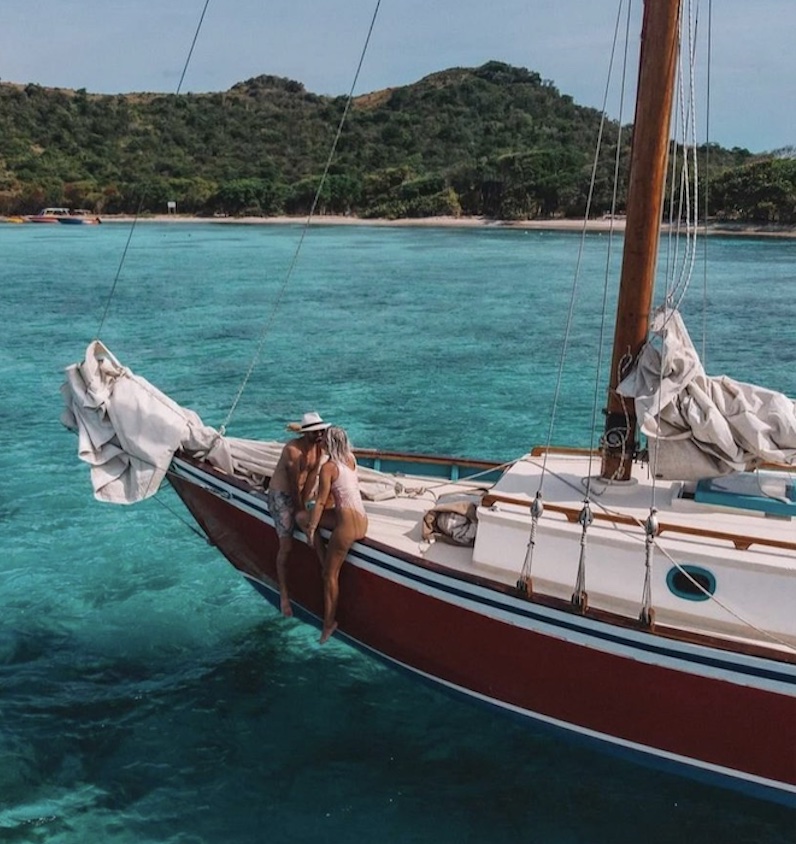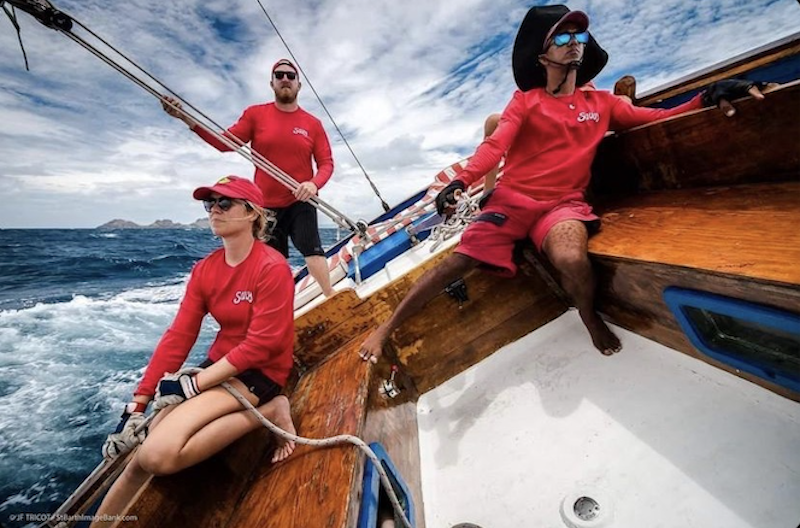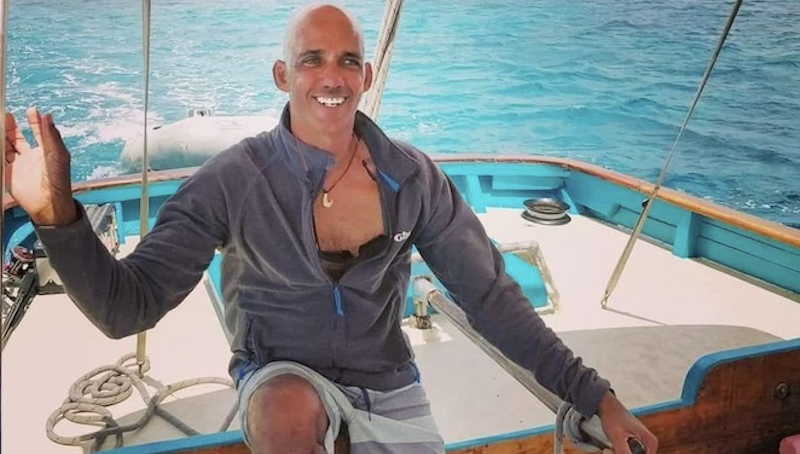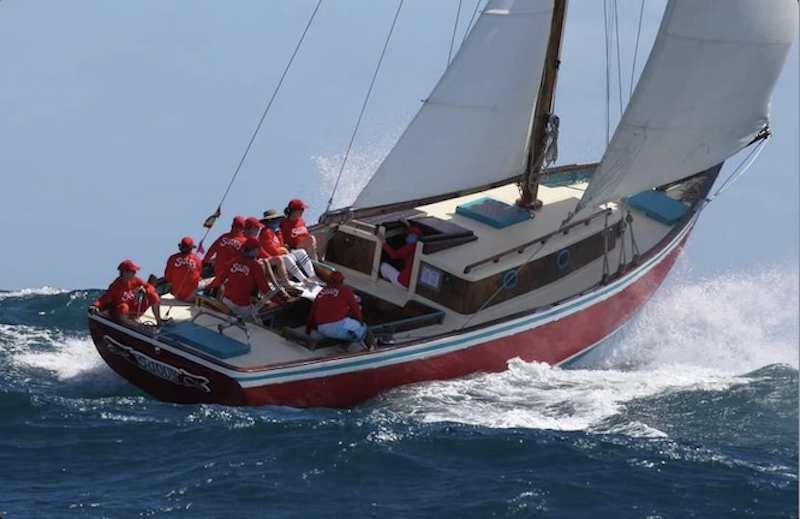Danny Donelan, a native of Grenada and an owner of a sailing charter company is keeping a 200-year-old legacy alive by using traditional wooden sloops to preserve the island's culture and the West Indian heritage.
Donelan, of Savvy Grenada Sailing Charters, is an avid sailor and believes in continuing the legacy of Caribbean sailing through wooden sloops. Those sloops nearly disappeared two decades ago.
While other islands in the West Indies are also trying to preserve the tradition, Grenada is the best island for tourists to experience traditional Caribbean sailing, according to Donelan. The island is the hub for traditional wooden sloops building.
The success of those who build the boats "shows our resilience as a people and our self-independence, and using the ocean to provide for ourselves for decades," Donelan recently told Forbes.
Donelan and his long-time friends are the crew of his charters, which offer numerous tours including sunset trips, whole-day or half-day snorkel trips. His company also offers multi-day trips up the Grenadines, and he only offers private charters for guests.
Each captain of the charter also built the boat, which creates another adventure for those who go aboard.
Donelan's charters have earned five-star ratings on both TripAdvisor and also on his Facebook page. Online reviews by those who have sailed have boasted about the experience. Some people commented on the tour's authenticity. Others commented that it was the best activity they engaged in during their entire week spent in Grenada. One guest wrote about the traditional boats' beauty and said they are "lovingly cared for and expertly sailed."
"Today was the best day! Worked a bit this a.m. then off on a sailing trip to the local beach islands thanks to Savvy Sailing and Captain Danny. We couldn’t have had a more perfect day. Swam and snorkels from the boat; saw lots of fish and even turtles. Sailing is so relaxing and tranquil. Can’t wait until next time Danny!" another person wrote.
Donelan recently spoke with Kinute Magazine and talked about his start in the sailing charter business and the traditional wooden sloops.
What is Savvy Grenada Sailing Charters?
Savvy Grenada Sailing Charters is my company that I started about 10 years ago. We sail and charter out traditional wooden sloops built on the shores of Windward, Carriacou and Petite Martinique (PM), our two sister islands.
These sloops carry with them 200 years of Grenada's boat-building culture, and I hire the very boatbuilders (when they are not building boats) to be the captains so our guests get first-hand knowledge from the builders who live this life every day.
This is not your cookie-cutter Disney packaged tour – this is the authentic Grenada lived by us locals, and we try to give our guests a true authentic taste of what we live like, how we sail, how we build our boats, what we eat and drink, the stories we tell, the importance of our boats to our identities as independent, resilient, proud, strong seamen with a history that came before us and one which we are holding onto desperately so our kids and grandkids can have this history to be proud of.

Photo courtesy of Danny Donelan
What was your inspiration for starting the business?
I was lucky enough to be at the launch of (the sloop) Savvy in 2007 and fell in love with the pageantry and culture of the launch. My ex-boss Peter Desavary (PDS) bought the sloop because he was interested in helping to maintain a dying art form at the time.
So, we all are hanging out on the beach in Petite Martinique ... and this stunning red sloop is on the shore where it has been built and everyone starts gathering around. First off was the traditional cake dancer who, dressed in her traditional wear, comes down the road toward the boat with a cake in her hand and starts dancing, almost letting the cake fall but saving it at the last moment with the crowd applauding every time she saves the cake.
Next, as the crowd gathers, everyone walks around the boat and inspects the work; and if they like the craftsmanship, then they leave a small token of their appreciation in a velvet pouch nailed onto the stern of the boat for the boatbuilder. Next, a goat is sacrificed on the deck signifying that this would be the last time blood should be shed on the deck and also as a peace offering to the sea. Next comes the priest to bless the launch and the boat. Next comes the string band with quadrilles, violins, banjos, guitars and bongo drums, and the men start playing while the women start singing to encourage the crowd to push the boat into the water.
This goes on for 15-minute intervals, then everyone stops for a drink and some food provided by the owner of the boat.
Everyone from sister islands Grenada, Carriacou, Union, Mayreau, Canouan and Bequia turn up on their speedboats (affectionately called 'cigarettes') to be part of the celebration. Eventually, after lots of drinks and food, the boat hits the water, and only then is the flag unfurled showing the name of the boat for the first time.
The name is normally a deeply guarded secret that is only known by the owner and the boatbuilder. And this causes a whole new set of discussions about whether the boat would be fast enough to compete in the oldest Caribbean Regatta, the Carriacou Regatta, that has been taking place for over 50 years and shows no sign of slowing down.
I think after witnessing the launch I was hooked. I knew that one day I would own one for myself. I was in love with the history of these boats with the resilience of the men that built them, of the tradition of passing the skill from father to son for over 200 years, of the community that goes with owning one of these sloops.
I got lucky sooner than I thought as working for the owner of Savvy I got the opportunity quite regularly to go sailing with him.
Working under PDS was a lesson in life and business and providing a product that was unique to Grenada. I soaked up everything he said and took in many life lessons on a daily basis.
One of the most important ones was, 'do what you are passionate about and you will never have to work another day in your life.'
So, with these lessons learned while sailing with him, we established a friendship; and when he was ready to sell Savvy I sent him an email explaining why he should sell her to me and not anyone else.
Well, I was either in the right place at the right time or our bond was strong enough or he thought I would be a good guardian to keep Savvy in the way he envisioned her, and before I knew it, I was the proud owner of a Petite Martinique sloop.
The day I owned Savvy was probably the day that changed my life most significantly. At the time, I was working at a marina and did fun trips on weekends with friends and the occasional tourist. I was never the booze cruise-type of cruise though and sort to do something a little different by offering tours that highlighted the history of these amazing boats. So, every tour would start off with stories -- if you meet anyone that knows me they will all say Danny loves to tell stories.
So I would start every trip by passionately talking about the history of these boats and how once upon a time they were the lifeblood of the Caribbean transporting all manner of goods, crops and people between the islands, about our notorious past as smugglers and building boats fast enough to outrun the police cutters and how they were all painted dark colors back in the old days to avoid detection at night when they pulled into port to release their cargos of rum and cigarettes.
These trips became for me an escape from the mundane 9-to-5 sitting in front of a computer at the office way of life. I patiently waited for Fridays to have the freedom of the wind in my sails and friends close by and just taking off and exploring new coral reefs or the Grenadines or regattas in Carriacou, Petite Martinique, Bequia, St Lucia, Antigua and St Barths. For me, it became not just about fun but about educating others on the history of these beautiful boats.
I have tried my best to translate this into my business with Savvy by hiring the local boatbuilders as the captains so that guests get first-hand knowledge on the culture and craftsmanship and the daily lives of the very people who live and breathe these boats every day.
I feel like everyone can jump onto a fiberglass boat anywhere in the world and go sailing, but when you come to Grenada, you should be coming onto a traditional wooden boat built by Grenadians and sailed by Grenadians so you can get a true authentic feel for the island and its people.
We also only do private charters, so we are better equipped than the booze cruisers out there who try to cram as many people on as possible. With our trips, you come with your family, with your loved ones, with your people, and we can set the vibe to make sure you get the quality time you deserve while you are on holiday. We also try to get our guests doing some sailing and fishing while out with us if they feel like getting involved.
How did you get into sailing?
My older brother lived with our grandparents growing up, and he got sailing lessons as a kid. At the time, my parents couldn't afford it so my older brother would take me out for hours sailing after his lessons and teach me the ropes. He was always a great sailor so kind of ironic that I ended up being the one making a living from sailing.
What were the challenges of starting the business?
I ... just did it as a side job until about five years ago when I quit the rat race to live a freer life. The biggest challenge over the last 10 years has definitely been 2020.
COVID basically put an end to tourism and charters in Grenada for over a year and even now it's still a challenge, but me and my guys have tried to be as flexible as possible and have done a few different things to keep us afloat. We have built a 20-foot cigarette (local speedboat made out of plywood). I ran a bar in Carriacou for about four months (at the) end of 2020, I went sailing for about three months (in) March 2020 and just did a bunch of fishing and kept expenses down to a minimum, which is easy when you are using the wind to get you from island to island and you get your food from the ocean.
Why use traditional sloops?
The main reason is because I'm a firm believer in doing local things when you go to new destinations. Why sail on a fiberglass boat that you can go sailing on anywhere else in the world when you can sail on a traditional wooden sloop with over 200 years of culture attached to it by the very boatbuilder that built it? I have always felt that if you want an interesting experience then go do it with the interesting people that live that life. Would you go to McDonald's if you traveled to India or would you prefer to try all the amazing Indian food cooked by the best Indian chefs?
Why is keeping the tradition in Grenada important?
We are the only island in the Caribbean that still builds these traditional sloops. This is who we are as a people. You have to know the past in order to move forward.
Grenada is one of the few places in the world where yachting is not an elitist white sport. This is because we build our own boats and use them for fishing, sailing, leisure, cargo, transportation. These boats are a very important part of who we are as a people.
Once upon a time, these boats were the lifeblood of the Caribbean, and it's important to me that in 200 years' time these boats will still be around so we can always remember our history and our place in this world as men of innovation, of substance, of resilience and most importantly as men who are free.
Boats give you freedom. You don't have to work for anyone when you own a boat. You can go fish, you can do charters, cargo, etc. Being able to take off sailing to far-off places and exploring is a huge part of being human and of human civilization throughout the ages.
Can you give a brief history of sloop building and sailing in Grenada?
Over 200 years ago in the early 1800s, the plantation owners brought in Scottish boatbuilders to build boats to transport their crops and merchandise between the Caribbean islands. These boats were the lifeblood of the Caribbean for close to 150 years until faster steel boats with bigger engines and the capacity to hold more cargo started taking over. The Scottish boatbuilders married Grenadian women and passed the boatbuilding trade down to the children, then their grandchildren all the way to today.
We are the only island in the Caribbean that stills builds these sloops, and we are extremely proud that we can be independent because of these boats.
The tradition was definitely dying until Alexis Andrews, a filmmaker from Antigua, filmed Vanishing Sail, which chronicles the journey of a boatbuilder and father who decides to build his last boat before passing the mantle onto the new generation of boatbuilders – his son. Through this film, private individuals have started buying these sloops to use as recreational yachts, and Alexis has also gotten many of the sloops involved in Caribbean regattas from the West Indies Regatta in St. Barths to the Antigua Classic Regatta, the Grenada Sail Week and, of course, the oldest regatta in the Caribbean, Carriacou Regatta.
It's because of these private owners and companies like Savvy Sailing Charter in Grenada or Jus Sail in St Lucia or Tradition Sailing Charters in Anguilla that the boat-building tradition continues.
Who knows how to build a sloop and how long does it take to build one?
It takes about 10 months to build one, and the best builder at the moment is Callistus Enoe, who is also one of Savvy's captains. At Savvy, we can also build you a sloop and deliver it to whatever country the owner is in.
How can someone learn to build a sloop? Are there schools or apprenticeship programs available?
No schools (are) available, but, once again, if you build one with Savvy, we can get you involved in the build and teaching you along the way as well.
Do you see increased interest in building and/or sailing in a sloop?
Yes, definitely especially after the film Vanishing Sail came out. Owners who want something authentic and a little different are definitely drawn to building a boat with us.
Do you enter your boats in regattas and, if so, which competitions, when and why? Can you describe the experience?
We take part every year in the Grenada Sail Week at the end of January. We then head up to Bequia for the Bequia Easter Regatta every Easter weekend. We then head over to Antigua for the Antigua Classic Regatta in April, then the West Indies Regatta in May in St. Barths. We do Petite Martinique Regatta in June, then the oldest regatta in the Caribbean, the Carriacou Regatta, in August. We also have done the St. Lucia Mango Bowl Regatta in September, which we have won twice with Savvy.
Nothing compares to regattas. It's basically four to five days of constant partying with some yacht races in between and lots of talks at the bar afterward about who made the best moves for the day, then off to the dancefloor to dance and laugh and chat with old and new friends.
To me, the start of the races has always been the most exciting, jostling for position between a bunch of different boats and passing sometimes mere feet away from other boats all trying to get the best start position as the gun goes off.
(The) second favorite part would be the camaraderie that you build with your crew during a regatta. We have been lucky enough to have the same guest charter race with us in Grenada for the last five years running, so we have developed amazing friendships with these guys along the way.
You start off most regattas as guest and captain, but after four days of racing and partying, you become best friends.

Photo courtesy of Danny Donelan
How has the business fared during COVID-19 and is it beginning to pick back up?
Well, it's been pretty nonexistent between March 2020 and May 2021 with no tourists visiting the island because of COVID. The crew and I have had to be very adaptive. I probably learned more about myself this year than any year before but that's a whole other interview.
I moved to Carriacou for four months to help a friend run a beach bar over there, which we made quite successful by doing what I love to do best; we brought in the traditional string bands and played all traditional music and got the local crowd very involved and also the yachters that were visiting Carriacou at the time.
I have always believed in giving people a part of the culture, so (I) wasn't about to change this recipe with the bar and it worked extremely well.
We also built a 20-foot local speedboat ... for some ex-pats who have a second home in Grenada. It's called "It's always Carib O Clock."
We also did some maintenance on other boats just to keep things ticking until tourists start coming back to our shores. We also cut rates drastically and went after the local market a lot more.
So, we have persevered and held on by a small margin, but you can definitely see things turning around now with the hotels reopening, so fingers crossed things will come back better than ever, especially because Grenada has zero COVID cases and we have taken this so seriously. We have actually seen lots of tourists here now who choose Grenada because of how safe we are.
What separates Grenada apart from other Caribbean nations?
Definitely the friendliness of our people. We are also a very safe island with very little crime, and I also feel like Grenada has a little bit of everything to offer, so white and black sand beaches, great diving and snorkeling, mountains, spices, great food, great service. But the one thing I feel really separates us is our authentic culture, especially in Carriacou ... in the boat-building traditions and all the cultural festivals that happen over there.
Also not being too big makes us quite intimate. Our carnivals and other festivals are not too big, not too expensive to take part (in), so you just end up meeting more people due to our small size.

Photo courtesy of Danny Donelan
What does a typical day on one of your charters look like?
Our guests meet us at Port Louis Marina and are handed a glass of freshly squeezed rum punch, then I give a small safety briefing and chat about the history of the sloops. We then take off sailing up the west coast, and I get the guests as involved or not involved as they please in the sailing. So, we have our guests grab onto the tiller, and we teach them how to steer the boat, or they can just lay back and relax and drink rum punches. We then head off to Flamingo Bay to snorkel and to the underwater sculpture park as well. On our way back, we have lots of local snacks, freshly baked the day of the charter; and sometimes if the guests want, we will do some fishing as well. We normally combine most of our trips with a sunset trip so our guests can really unwind and enjoy the sunset.
Where are your most favorite places to take tourists and why?
Flamingo Bay on the west coast of Grenada because of the underwater life. Saline and White Island in Carriacou because the waters and sailing and underwater life are amazing over here.
Where do your guests typically come from?
Mostly the U.S. and U.K.
How can tourists book a tour and how far in advance should they do it?
They can call me on 473-409-3255 or WhatsApp or email danny_donelan1@hotmail.com or IM on Instagram at Savvysailing. I recommend booking a month in advance, but we take bookings up to 24 hours before if we are free.
What time of year is best to sail?
Any time of the year in Grenada as it doesn't rain that much even in the rainy season.
What is the one takeaway that you want your guests to leave with after sailing with you?
You can sail on a fiberglass yacht anywhere in the world. When you come to Grenada, come sailing on a traditional wooden sloop with the very boatbuilders as your captains. Come experience something real and authentic. We only do private charters, so when you come on board, you come with your friends and loved ones and no strangers to mess with your vibe. Because we only do private charters, we can cater to your individual needs.
